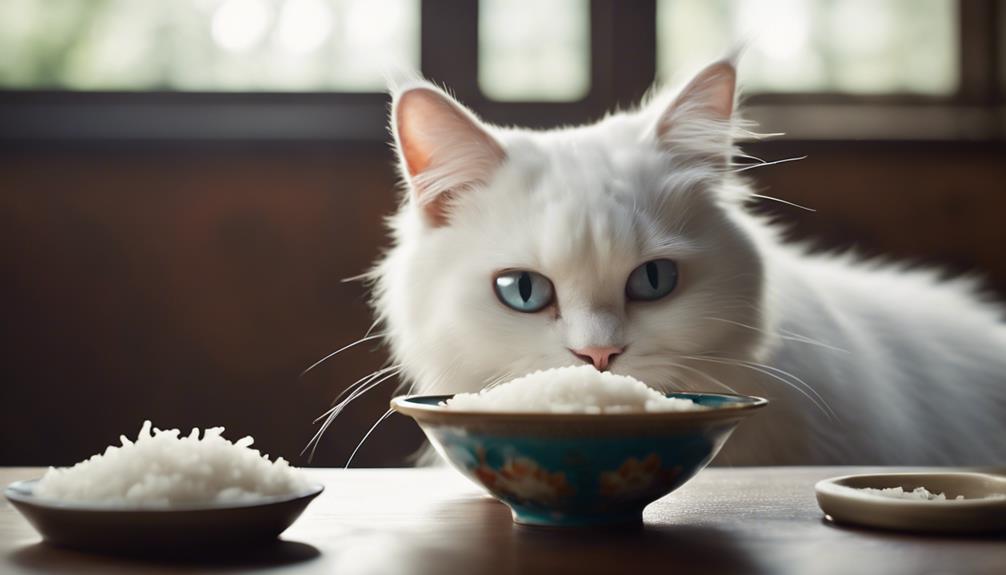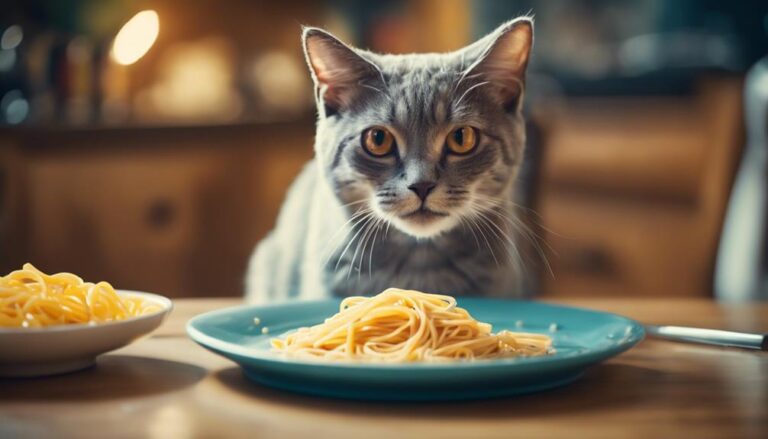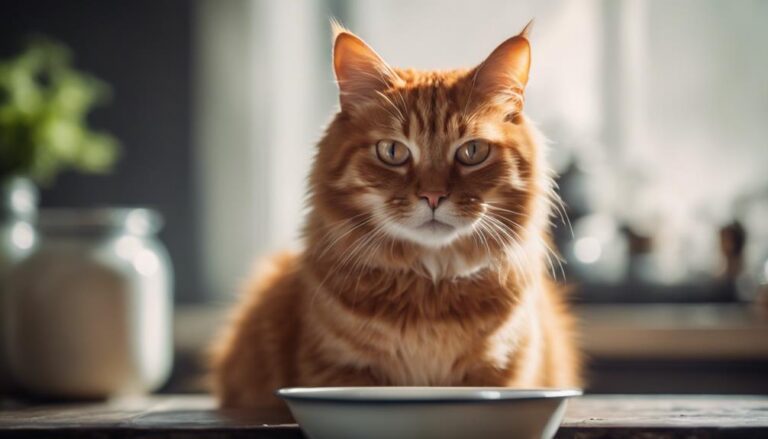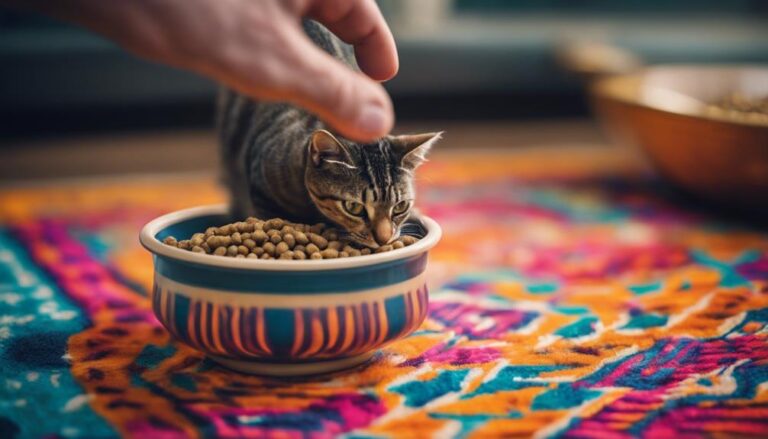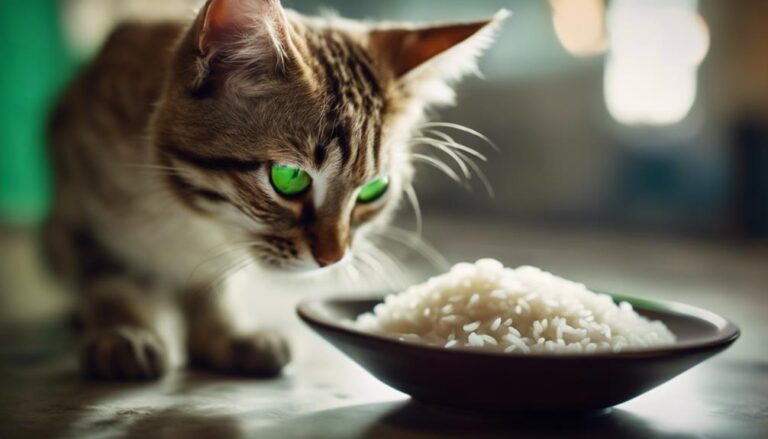You may have wondered if cats can eat white rice. Well, the answer is not a simple yes or no. While cats can consume white rice, there are crucial considerations to keep in mind. The impact of incorporating this common food into your feline friend's diet goes beyond just the act of feeding. So, before you make any decisions about including white rice in your cat's meals, let's explore the various aspects that come into play when it comes to feline nutrition and well-being.
Nutritional Value of White Rice for Cats
When considering the nutritional value of white rice for cats, it's crucial to acknowledge its lack of essential nutrients and primarily empty calories. While cats are obligate carnivores and their diet should consist mainly of animal-based protein, they can eat small amounts of white rice as a treat or to help with digestive issues. However, white rice shouldn't be a significant part of their diet due to its limited nutritional benefits. Feeding cats white rice in large quantities can lead to health problems like obesity since it's calorie-dense but lacking in essential nutrients.
Even though white rice is safe for cats to consume in moderation, it's essential to remember that it's processed and stripped of nutrients compared to brown rice. Therefore, consulting with a veterinarian before incorporating white rice into your cat's diet is advisable to ensure that their nutritional needs are adequately met without compromising their health. Remember to prioritize a balanced diet rich in high-quality animal protein for your feline companion's overall well-being.
Risks of Excessive Rice Consumption
Excessive consumption of white rice by cats can significantly increase their risk of obesity and related health issues. Cats that consume too much white rice are more prone to becoming overweight, which can further lead to diabetes, arthritis, and heart disease.
White rice lacks essential nutrients that are vital for a cat's overall health, and overfeeding it can disrupt the balance of nutrients in their diet. It's crucial to be mindful of the amount of white rice you feed your cat to prevent potential health issues associated with obesity and nutrient deficiencies.
Symptoms of Feline Diabetes
If your cat starts drinking more water than usual and is urinating frequently, it could be a sign of diabetes. Weight loss despite a healthy appetite and decreased energy levels are also common indicators of feline diabetes.
Monitoring your cat's symptoms and blood sugar levels is crucial for managing this condition effectively.
Diabetes Warning Signs
Early detection of feline diabetes is crucial due to the serious health complications that can arise if left untreated. Symptoms of feline diabetes include weight loss despite an increased appetite, excessive thirst, increased urination, lethargy, weakness, and dehydration.
If you notice your cat displaying these signs, it's essential to consult a veterinarian promptly for proper diagnosis and treatment. Unchecked feline diabetes can lead to severe issues, such as nerve damage, ketoacidosis, and even death.
Regular veterinary check-ups play a vital role in monitoring your cat's health and catching any potential problems early on. By recognizing the warning signs of diabetes in your cat and seeking timely medical attention, you can help manage the condition effectively and improve your feline friend's quality of life.
Health Risks Associated
Monitor your cat closely for signs such as excessive thirst, increased urination, weight loss, and lack of appetite, as these could indicate potential health risks associated with feline diabetes.
Feeding your cat excessive amounts of carbohydrates from white rice can lead to obesity and contribute to the development of diabetes. Cats, being obligate carnivores, don't require carbohydrates like those present in white rice. Excessive consumption of white rice can disrupt your cat's diet and lead to various health issues.
To prevent complications related to excessive carbohydrate intake, it's crucial to monitor your cat's diet carefully and ensure it's balanced with the appropriate nutrients.
Monitoring Blood Sugar
To ensure the well-being of your diabetic cat, closely monitor their blood sugar levels for symptoms such as increased thirst and urination. Here are some essential points to consider when monitoring your cat's blood sugar levels:
- Symptoms: Watch out for signs like increased thirst, excessive urination, weight loss despite a good appetite, and lethargy.
- Complications: Untreated feline diabetes can lead to severe complications such as ketoacidosis, nerve damage, and even blindness.
- Regular Monitoring: Consistent monitoring of blood glucose levels is crucial to manage feline diabetes effectively.
- Veterinary Check-ups: Schedule regular veterinary check-ups to assess your cat's condition and adjust treatment plans as needed.
Moderation in Feeding White Rice
When feeding white rice to your cat, remember to control the portion size and frequency to prevent any potential health issues. Moderation is key to ensuring that your cat receives the necessary nutrients from a balanced diet.
Keep a close eye on how much white rice your cat consumes to maintain their overall well-being.
Portion Size Recommendations
When incorporating white rice into your cat's diet, remember to keep the portion size in check to maintain their overall health and well-being. Here are some important points to consider:
- Feed white rice to cats in small quantities as an occasional treat.
- Limit the amount of white rice to less than a tablespoon per week for your cat.
- White rice lacks significant nutritional benefits for your feline friend.
- Excessive carbohydrates from white rice can contribute to health issues and obesity in cats.
Prioritize a balanced diet for your pet over white rice as a regular food item to ensure they receive the necessary nutrients for optimal health.
Frequency of Feeding
Feeding white rice to your cat should be approached with moderation to ensure their overall well-being and health. While cats can eat rice, it lacks significant nutritional benefits and may lead to potential health issues if fed excessively.
Limit the frequency of offering white rice to your feline friend to prevent any adverse effects from the lack of essential nutrients in their diet. It's best to view white rice as an occasional treat rather than a regular component of their meals.
Incorporating White Rice Sparingly
Consider incorporating white rice sparingly into your cat's diet by following these guidelines:
- Small Amounts: Cats can eat white rice but in small quantities to prevent any potential stomach upset.
- Nutritional Benefits: While white rice lacks significant nutritional benefits for cats, it can be a part of a balanced diet if used sparingly.
- Balanced Diet: Ensure that white rice doesn't exceed 25% of your cat's total meal to maintain a balanced diet.
- Sensitive Stomach: Monitor your cat for any signs of an upset stomach after introducing white rice into their diet.
When feeding your cat white rice, remember that it should be plain, well-cooked, and unseasoned. While it can be an essential part of their diet, prioritize meat as the primary ingredient over white rice.
Importance of Balanced Cat Diet
To ensure your cat's optimal health and well-being, it's crucial to provide them with a diet rich in essential nutrients such as animal proteins and fats instead of relying on white rice. Cats are obligate carnivores, meaning their bodies are designed to thrive on a diet primarily composed of animal proteins and fats. White rice lacks the necessary nutrients that cats need to stay healthy. Feeding your cat a diet heavy in white rice can lead to nutritional deficiencies over time, potentially resulting in various health issues.
Brown rice, while slightly better due to its higher fiber content and some additional nutrients, is still not an ideal staple for a cat's diet. Cats require specific amino acids, like taurine, which are found in animal proteins but are lacking in plant-based foods like rice. Opting for a diet rich in animal proteins and fats ensures that your cat receives the essential nutrients vital for their overall health and supports their natural dietary requirements as obligate carnivores.
White Rice as Occasional Treat
As an occasional treat, small amounts of white rice can be given to cats. Here are some key points to consider:
- Nutritional Value: White rice lacks significant nutrients compared to brown rice, so it shouldn't be a staple in a cat's diet.
- Carbohydrates: Feeding white rice to cats should be limited as it can contribute to excessive carbohydrates in their diet, which may not align with their nutritional needs.
- Preference: Cats may prefer smaller grains like oats or barley, which are easier to digest compared to white rice.
- Balanced Diet: While white rice can be a treat, it shouldn't replace a balanced cat food diet essential for optimal feline health.
Frequently Asked Questions
Can I Feed My Cat Chicken and Rice?
You can feed your cat chicken and rice as a bland diet option for digestive issues. This combo provides protein and easily digestible carbs, soothing upset stomachs. Ensure the chicken is cooked well and serve plain rice. Always consult your vet before changing your cat's diet.
Can I Give My Cat a Piece of Rice?
You can give your cat a piece of rice as an occasional treat. Remember, white rice lacks essential nutrients for cats and can cause health issues if given in excess. Always ensure it's plain, well-cooked, and doesn't replace their balanced diet.
Can Cats Eat White Rice and Tuna?
When it comes to feeding your feline friend, remember that while cats can eat white rice and tuna separately, it's best to avoid combining them. Moderation with tuna is key due to mercury concerns, and white rice lacks essential nutrients for cats.
Can Cats Eat Scrambled Eggs?
Yes, cats can eat scrambled eggs as an occasional treat. Make sure eggs are thoroughly cooked to avoid salmonella. Avoid adding seasoning. Consult a vet before adding scrambled eggs to your cat's diet for safety.

